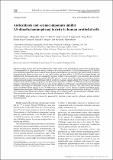Antioxidants and selenocompounds inhibit 3,5-dimethylaminophenol toxicity to human urothelial cells
Author(s)
Erkekoglu, Ulfet Pinar; Chao, Ming-Wei; Tseng, Chia-Yi; Engelward, Bevin P; Kose, Ozge; Kocer-Gumusel, Belma; Wogan, Gerald N; Tannenbaum, Steven R; ... Show more Show less
DownloadPublished version (514.2Kb)
Publisher with Creative Commons License
Publisher with Creative Commons License
Creative Commons Attribution
Terms of use
Metadata
Show full item recordAbstract
Exposure to alkyl anilines may lead to bladder cancer, which is the second most frequent cancer of the urogenital tract. 3,5-dimethylaniline is highly used in industry. Studies on its primary metabolite 3,5-dimethylaminophenol (3,5-DMAP) showed that this compound causes oxidative stress, changes antioxidant enzyme activities, and leads to death of different mammalian cells. However, there is no in vitro study to show the direct effects of 3,5-DMAP on human bladder and urothelial cells. Selenocompounds are suggested to decrease oxidative stress caused by some chemicals, and selenium supplementation was shown to reduce the risk of bladder cancer. The main aim of this study was to investigate whether selenocompounds organic selenomethionine (SM, 10 μmol/L) or inorganic sodium selenite (SS, 30 nmol/L) could reduce oxidative stress, DNA damage, and apoptosis in UROtsa cells exposed to 3,5-DMAP. 3,5-DMAP caused a dose-dependent increase in intracellular generation of reactive oxygen species, and its dose of 50 μmol/L caused lipid peroxidation, protein oxidation, and changes in antioxidant enzyme activities in different cellular fractions. The comet assay also showed single-strand DNA breaks induced by the 3,5-DMAP dose of 50 μmol/L, but no changes in double-strand DNA breaks. Apoptosis was also triggered. Both selenocompounds provided partial protection against the cellular toxicity of 3,5-DMAP. Low selenium status along with exposure to alkyl anilines can be a major factor in the development of bladder cancer. More mechanistic studies are needed to specify the role of selenium in bladder cancer.
Date issued
2019-04Department
Massachusetts Institute of Technology. Department of Biological EngineeringJournal
Archives of Industrial Hygiene and Toxicology
Publisher
Walter de Gruyter GmbH
Citation
Erkekoglu, Pinar et al. "Antioxidants and selenocompounds inhibit 3,5-dimethylaminophenol toxicity to human urothelial cells." Archives of Industrial Hygiene and Toxicology (April 2019): 18-29 © 2019 The Author(s)
Version: Final published version
ISSN
0004-1254